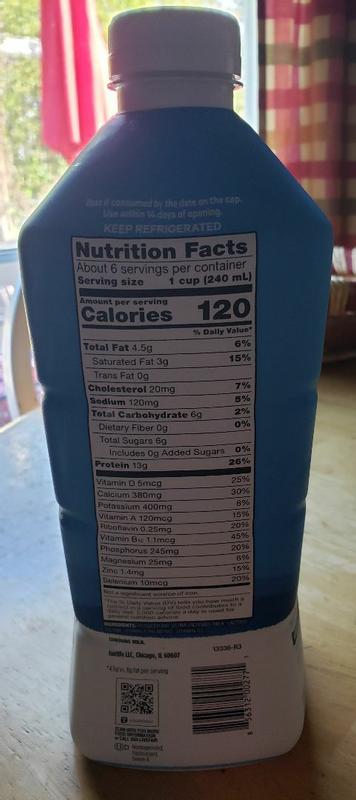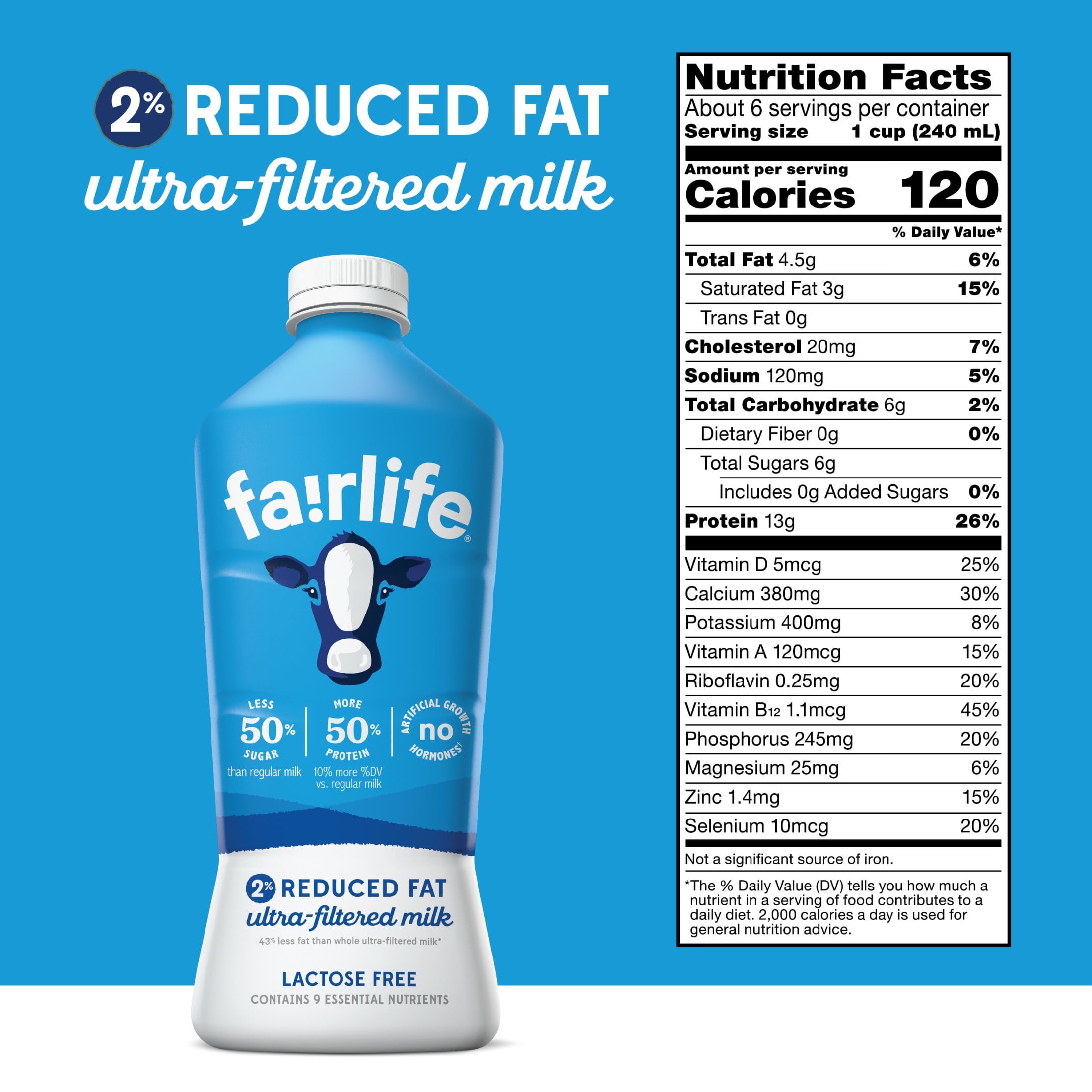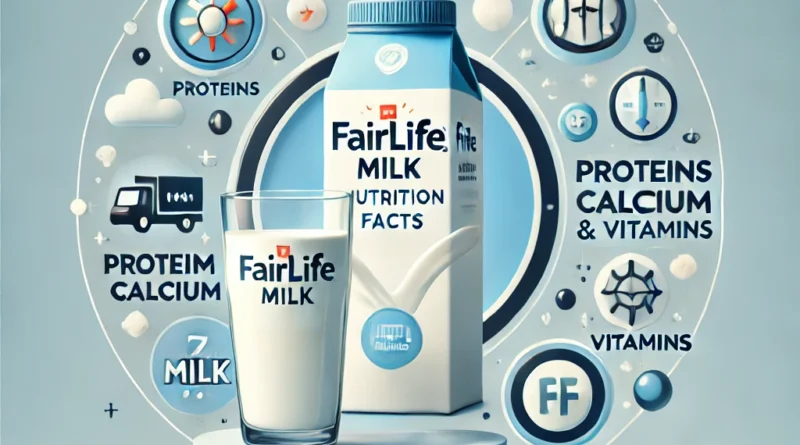Fairlife Milk Nutrition Facts: The Ultimate Health Booster
Fairlife Milk has become a popular choice for many people. But what makes it stand out?
This blog post will explore the nutritional facts of Fairlife Milk. You’ll learn what sets it apart from other milk options. Fairlife Milk boasts higher protein content and less sugar. It’s also lactose-free, making it suitable for those with lactose intolerance.
Understanding these nutrition facts can help you make better dietary choices. Whether you’re health-conscious or just curious, this guide will provide valuable insights. So, let’s dive into the details of Fairlife Milk and see why it might be a good addition to your diet.
Nutritional Profile
Fairlife Milk is known for its rich nutritional profile. This milk stands out due to its unique filtration process, which enhances its nutritional value. Let’s take a closer look at the nutritional profile of Fairlife Milk, including its calories, serving size, and macronutrient breakdown.
Calories And Serving Size
Fairlife Milk offers a balanced amount of calories, making it a good choice for those watching their intake. A typical serving size of Fairlife Milk is 1 cup (240 ml). Here’s what you can expect in terms of calories:
- Fat-Free Milk: 80 calories per serving
- Reduced Fat 2% Milk: 120 calories per serving
- Whole Milk: 150 calories per serving
- Chocolate Milk: 140 calories per serving
These calorie counts are relatively low, making Fairlife Milk a suitable option for any diet. The serving size of 1 cup provides enough nutrients without adding excessive calories. For those who prefer flavored milk, Fairlife’s chocolate variety adds a bit more to the calorie count but remains a reasonable choice for a treat.
Macronutrient Breakdown
Fairlife Milk is rich in essential macronutrients. Here’s a breakdown of the key components:
| Type | Protein (g) | Fat (g) | Carbs (g) | Sugar (g) |
|---|---|---|---|---|
| Fat-Free Milk | 13 | 0 | 6 | 6 |
| Reduced Fat 2% Milk | 13 | 4.5 | 6 | 6 |
| Whole Milk | 13 | 8 | 6 | 6 |
| Chocolate Milk | 13 | 4.5 | 13 | 12 |
Protein: Each serving of Fairlife Milk contains 13 grams of protein, which is higher than regular milk. This makes it great for muscle building and recovery. Fat: Fat content varies by type. Fat-free milk has no fat, while whole milk contains 8 grams per serving. Reduced fat and chocolate milk have moderate fat levels. Carbs and Sugar: Fairlife Milk has 6 grams of carbs in most varieties. Chocolate milk has higher carbs due to added sugars. Regular varieties have 6 grams of sugar, while chocolate milk contains 12 grams. Fairlife Milk is a nutritious option for those looking to maintain a balanced diet. It offers high protein, moderate fat, and reasonable carbs and sugar content.
Vitamin Content
Fairlife Milk is known for its rich nutritional profile. One of the standout features of this milk is its vitamin content. Vitamins are essential for maintaining good health and supporting various bodily functions. Let’s explore the vitamins present in Fairlife Milk and understand how they contribute to your well-being.
Essential Vitamins
Fairlife Milk contains several essential vitamins that are crucial for your health. These vitamins help in various bodily functions and keep you fit and active. Here are the key vitamins found in Fairlife Milk:
- Vitamin A: Essential for eye health, immune function, and skin health.
- Vitamin D: Important for bone health and calcium absorption.
- Vitamin B12: Helps in the formation of red blood cells and proper nerve function.
- Riboflavin (Vitamin B2): Supports energy production and cellular function.
Here’s a table to give you a clearer idea of the vitamin content in an 8-ounce serving of Fairlife Milk:
| Vitamin | Amount per Serving | % Daily Value |
|---|---|---|
| Vitamin A | 500 IU | 10% |
| Vitamin D | 100 IU | 25%</td |
| Vitamin B12 | 1.2 mcg | 50% |
| Riboflavin | 0.45 mg | 35% |
These vitamins play vital roles in keeping you healthy. They support your vision, bone strength, and energy levels. Including Fairlife Milk in your diet ensures you get these essential nutrients in a delicious way.
Fortified Nutrients
Fairlife Milk is not just rich in natural vitamins; it is also fortified with additional nutrients. Fortification enhances the milk’s nutritional value, making it even more beneficial for your health. Here are some of the key fortified nutrients in Fairlife Milk:
- Calcium: Strengthens bones and teeth.
- Potassium: Maintains proper heart and muscle function.
- Phosphorus: Supports healthy bones and teeth.
Fortified nutrients ensure that you get more out of each serving. Here’s a table showing the fortified nutrients in an 8-ounce serving of Fairlife Milk:
| Nutrient | Amount per Serving | % Daily Value |
|---|---|---|
| Calcium | 400 mg | 40% |
| Potassium | 400 mg | 11% |
| Phosphorus | 300 mg | 25% |
Fortified nutrients in Fairlife Milk help in maintaining strong bones, proper muscle function, and overall health. Drinking Fairlife Milk regularly ensures you receive these added benefits, making it a smart choice for your daily diet.
Mineral Composition
Fairlife Milk is known for its rich nutritional profile. One of the standout features is its impressive mineral composition. Minerals are vital for various bodily functions, and Fairlife Milk ensures you get a good dose of these essential nutrients. Let’s dive into the key minerals present in Fairlife Milk and explore the health benefits they offer.
Key Minerals
Fairlife Milk contains several important minerals that contribute to its nutritional value. These key minerals include calcium, potassium, phosphorus, and magnesium. Each of these minerals plays a crucial role in maintaining overall health.
- Calcium: Fairlife Milk is an excellent source of calcium. One serving provides about 30% of the daily recommended intake. Calcium is essential for strong bones and teeth. It also plays a role in muscle function and nerve signaling.
- Potassium: This mineral helps regulate fluid balance, muscle contractions, and nerve signals. Fairlife Milk contains around 380 mg of potassium per serving, which is about 8% of the daily recommended intake.
- Phosphorus: Phosphorus works with calcium to build strong bones and teeth. It also helps the body use carbohydrates and fats. A serving of Fairlife Milk provides about 25% of the daily recommended intake of phosphorus.
- Magnesium: This mineral is involved in over 300 biochemical reactions in the body. It helps with muscle and nerve function, blood glucose control, and protein synthesis. Fairlife Milk offers a moderate amount of magnesium, contributing to your daily needs.
| Mineral | Amount per Serving | % Daily Value |
|---|---|---|
| Calcium | 300 mg | 30% |
| Potassium | 380 mg | 8% |
| Phosphorus | 250 mg | 25% |
| Magnesium | 40 mg | 10% |
Health Benefits
The minerals in Fairlife Milk offer numerous health benefits. Regular consumption can improve bone health, support muscle function, and enhance overall well-being. Bone Health: Calcium and phosphorus are vital for maintaining strong bones and teeth. Adequate intake of these minerals can help prevent conditions like osteoporosis and fractures. Muscle Function: Potassium and magnesium play key roles in muscle contractions and relaxation. They help prevent muscle cramps and support overall muscle health. Nerve Function: Calcium and magnesium are essential for proper nerve function. They help transmit nerve signals, ensuring efficient communication between the brain and body. Fluid Balance: Potassium helps regulate fluid balance in the body. It ensures that cells function correctly and supports overall hydration. Energy Production: Phosphorus is crucial for energy production. It helps convert food into energy, keeping you active and alert throughout the day. Incorporating Fairlife Milk into your diet can provide these benefits and support your overall health. Its rich mineral composition makes it a valuable addition to your daily nutrition.

Protein Quality
Fairlife Milk is known for its high nutritional value, and one of its standout features is the quality of protein it offers. Protein quality is crucial for various bodily functions, including muscle repair, growth, and overall health. Fairlife Milk provides a rich source of high-quality protein that can benefit individuals of all ages.
Source Of Protein
Fairlife Milk derives its protein from ultra-filtered milk, ensuring that you get a concentrated amount of this vital nutrient. The ultra-filtration process removes most of the lactose and some of the sugar while retaining more protein and calcium. This makes Fairlife Milk an excellent choice for those seeking to increase their protein intake without consuming extra sugars. Here are some key points about the protein in Fairlife Milk:
- High Protein Content: Fairlife Milk contains 13 grams of protein per serving, which is significantly higher than regular milk.
- Complete Protein: The protein in Fairlife Milk is a complete protein, meaning it contains all nine essential amino acids that the body cannot produce on its own.
- Low Lactose: The ultra-filtration process reduces lactose content, making it easier to digest for those with lactose intolerance.
The table below highlights the protein content in different types of Fairlife Milk compared to regular milk:
| Type of Milk | Protein per Serving (g) |
|---|---|
| Fairlife Whole Milk | 13 |
| Fairlife 2% Reduced Fat Milk | 13 |
| Fairlife Fat-Free Milk | 13 |
| Regular Whole Milk | 8 |
Benefits For Muscle Health
Consuming high-quality protein, like that found in Fairlife Milk, offers numerous benefits for muscle health. Protein is essential for muscle repair and growth, making it a crucial nutrient for athletes and active individuals. Here are some benefits of Fairlife Milk’s protein for muscle health:
- Muscle Repair: After a workout, muscles need protein to repair and rebuild. The high protein content in Fairlife Milk supports this recovery process.
- Muscle Growth: Regular intake of high-quality protein promotes muscle growth, which is beneficial for those looking to increase muscle mass.
- Sustained Energy: Protein provides a slow and steady release of energy, helping to sustain muscle performance during extended physical activities.
- Weight Management: Protein helps to keep you full longer, reducing the urge to snack and aiding in weight management.
Incorporating Fairlife Milk into your diet can be a simple and effective way to ensure you are getting the protein needed for optimal muscle health. Whether you drink it plain, add it to smoothies, or use it in recipes, Fairlife Milk offers a convenient and nutritious option.
Lactose-free Benefits
Fairlife Milk offers a variety of nutritional benefits, especially for those who are lactose intolerant. Lactose-free milk means you can enjoy all the goodness of milk without any digestive discomfort. It provides essential nutrients while being gentle on your stomach. Let’s explore how Fairlife Milk can be beneficial for different people and its positive impact on digestive health.
Who Can Benefit?
Many people can benefit from Fairlife Milk, especially those who are lactose intolerant. Lactose intolerance means the body cannot digest lactose, a sugar found in milk. Drinking regular milk can cause bloating, gas, and diarrhea in such individuals. Fairlife Milk is a great alternative as it is lactose-free.
- Individuals with Lactose Intolerance: They can enjoy the taste and nutritional benefits of milk without discomfort.
- People with Digestive Issues: Lactose-free milk is easier on the stomach and can help avoid digestive problems.
- Health-Conscious Individuals: Fairlife Milk is rich in protein and calcium, making it a healthy choice.
Fairlife Milk is also beneficial for people following a low-sugar diet. It has reduced sugar content compared to regular milk. Athletes and fitness enthusiasts can benefit from its high protein content. Protein helps in muscle recovery and growth. For parents, Fairlife Milk can be a good choice for their children. It provides essential nutrients necessary for growth and development. It is also an excellent option for elderly people who may have sensitive digestive systems. The table below highlights the comparison of nutritional content between Fairlife Milk and regular milk:
| Nutrient | Fairlife Milk | Regular Milk |
|---|---|---|
| Protein (per cup) | 13g | 8g |
| Calcium (per cup) | 370mg | 300mg |
| Sugar (per cup) | 6g | 12g |
Digestive Health
Digestive health is crucial for overall well-being. Lactose-free milk like Fairlife can play a significant role in maintaining a healthy digestive system. Lactose intolerance can cause various digestive issues. Fairlife Milk eliminates these issues by removing lactose. Here are some benefits of Fairlife Milk for digestive health:
- Reduced Bloating: Lactose-free milk reduces the chances of bloating, making you feel more comfortable.
- Less Gas: With no lactose, there is less gas production in the stomach.
- Prevent Diarrhea: Drinking lactose-free milk helps in preventing diarrhea caused by lactose intolerance.
Fairlife Milk is also fortified with additional nutrients. It contains more protein and calcium compared to regular milk. Protein is essential for repairing tissues and building muscles. Calcium is vital for strong bones and teeth. By choosing Fairlife Milk, you can enjoy a delicious and nutritious beverage without worrying about digestive issues. It is a great option for maintaining digestive health while still getting all the benefits of milk. So, if you are lactose intolerant or have other digestive concerns, consider switching to Fairlife Milk. It offers a safe and healthy alternative that supports your digestive health.
Calcium And Bone Health
Fairlife Milk is known for its rich nutritional profile. One of the key nutrients found in Fairlife Milk is calcium. Calcium is essential for bone health. Understanding the benefits of calcium and how Fairlife Milk compares to regular milk can help you make informed choices.
Importance Of Calcium
Calcium plays a vital role in maintaining strong bones and teeth. It also supports muscle function, nerve signaling, and heart health. Here are some key points about the importance of calcium:
- Bone Density: Calcium helps build and maintain bone density, reducing the risk of osteoporosis.
- Teeth Health: Adequate calcium intake keeps teeth strong and healthy.
- Muscle Function: Calcium assists in muscle contractions, including those of the heart.
- Nerve Signaling: It plays a role in transmitting nerve impulses.
Adults need about 1,000 milligrams of calcium per day. This requirement increases to 1,200 milligrams for women over 50 and men over 70. Calcium-rich foods include dairy products, leafy greens, and fortified foods.
Fairlife Vs. Regular Milk
Fairlife Milk stands out due to its unique filtration process. This process enriches its nutritional content. Let’s compare Fairlife Milk to regular milk:
| Nutrient | Fairlife Milk (per cup) | Regular Milk (per cup) |
|---|---|---|
| Calcium | 370 mg | 300 mg |
| Protein | 13 grams | 8 grams |
| Sugar | 6 grams | 12 grams |
| Lactose | 0 grams | 12 grams |
Fairlife Milk offers more calcium and protein than regular milk. It also has less sugar and is lactose-free. This makes it a great choice for those who are lactose intolerant or looking to reduce sugar intake. With higher calcium content, Fairlife Milk supports bone health better than regular milk.
Dietary Considerations
Fairlife Milk is a popular choice for those seeking a nutritious and versatile dairy product. When considering the dietary aspects, it’s essential to understand how Fairlife Milk fits into different dietary needs and any potential allergy information. This knowledge helps make informed decisions about including Fairlife Milk in your diet.
Suitable For Various Diets
Fairlife Milk caters to a wide range of dietary requirements, making it an excellent option for many people. Here are some key points about its suitability:
- Low Carb and Keto Diets: Fairlife Milk is lower in carbohydrates compared to regular milk. This makes it a great choice for those following low-carb or ketogenic diets.
- High Protein: With its high protein content, Fairlife Milk supports muscle building and repair, making it ideal for athletes and fitness enthusiasts.
- Lower Sugar: Fairlife Milk has reduced sugar content, which benefits those monitoring their sugar intake, such as people with diabetes.
- Gluten-Free: Fairlife Milk is gluten-free, making it safe for individuals with gluten intolerance or celiac disease.
Here’s a comparison of Fairlife Milk with regular milk:
| Nutrient | Fairlife Milk (per cup) | Regular Milk (per cup) |
|---|---|---|
| Calories | 80 | 150 |
| Protein | 13g | 8g |
| Carbohydrates | 6g | 12g |
| Sugar | 5g | 12g |
Allergy Information
Understanding allergy information is crucial for those with dietary restrictions. Here are some important points about Fairlife Milk:
- Lactose-Free: Fairlife Milk is lactose-free, making it suitable for individuals with lactose intolerance. This allows those who usually avoid dairy to enjoy milk without discomfort.
- Dairy Allergy: Although it’s lactose-free, Fairlife Milk still contains dairy. Individuals with a milk allergy should avoid it to prevent allergic reactions.
Here’s a summary of key allergen information:
| Allergen | Presence in Fairlife Milk |
|---|---|
| Lactose | No |
| Casein and Whey (Milk Proteins) | Yes |
| Gluten | No |
For those with specific allergies or intolerances, always check labels and consult with a healthcare provider to ensure Fairlife Milk is safe for consumption.

Usage Ideas
Fairlife Milk is known for its rich nutritional profile, offering more protein and calcium than regular milk, with less sugar. This makes it a versatile ingredient for various uses. Here are some creative ways to incorporate Fairlife Milk into your daily diet and cooking.
In Recipes
Fairlife Milk is a fantastic addition to many recipes, enhancing both flavor and nutritional value. Here are a few ideas:
- Smoothies: Use Fairlife Milk as a base for your smoothies. It adds a creamy texture and boosts protein content.
- Baking: Replace regular milk with Fairlife Milk in cakes, muffins, and bread. This swap enhances the protein content of your baked goods.
- Soups: Add Fairlife Milk to your soups for a richer, creamier texture. It works well in tomato soup, chowder, and bisques.
- Pancakes and Waffles: Substitute Fairlife Milk in your pancake or waffle batter for a protein-packed breakfast.
For a quick comparison, see the table below:
| Recipe | Standard Milk | Fairlife Milk |
|---|---|---|
| Smoothies | Regular texture, standard protein | Creamy texture, higher protein |
| Baking | Standard protein | Enhanced protein |
| Soups | Less creamy | Richer, creamier texture |
| Pancakes/Waffles | Standard protein | Protein-packed |
Daily Consumption Tips
Incorporating Fairlife Milk into your daily routine is simple and beneficial. Here are some tips:
- Morning Coffee: Replace your regular creamer with Fairlife Milk. It adds a creamy taste and boosts the protein intake for your morning.
- Breakfast Cereal: Pour Fairlife Milk over your cereal. This is an easy way to increase your protein and calcium intake.
- Post-Workout Drink: Use Fairlife Milk as a base for your post-workout protein shake. It helps in muscle recovery due to its high protein content.
- Cooking: Use Fairlife Milk in mashed potatoes, sauces, and gravies. It enhances the texture and nutritional value of your dishes.
- Evening Snack: Enjoy a glass of Fairlife Milk with a small snack. It helps keep you full longer and provides essential nutrients.
Fairlife Milk fits easily into various parts of your daily diet. Its high protein and calcium content make it a smart choice for anyone looking to improve their nutrition.

Frequently Asked Questions
What Are The Nutritional Benefits Of Fairlife Milk?
Fairlife Milk is high in protein, low in sugar, and lactose-free. It also contains essential vitamins and minerals. This makes it a healthier alternative to regular milk.
How Many Calories Are In Fairlife Milk?
A cup of Fairlife Milk contains approximately 80 to 150 calories. The exact count depends on the type of Fairlife Milk (whole, 2%, skim, etc. ).
Is Fairlife Milk Lactose-free?
Yes, Fairlife Milk is lactose-free. It undergoes a special filtration process that removes lactose, making it suitable for lactose-intolerant individuals.
Does Fairlife Milk Contain Added Sugar?
Fairlife Milk contains no added sugar. It has naturally occurring sugars, and its filtration process reduces sugar content compared to regular milk.
Conclusion
Fairlife Milk offers a nutritious choice for health-conscious individuals. It provides high protein and calcium. Reduced sugar content makes it suitable for those watching their intake. Lactose-free options cater to those with sensitivities. Fairlife Milk balances taste and health benefits effectively.
Consider adding it to your daily diet. Enjoy its creamy texture and nutritional value. Make a healthier choice today.




